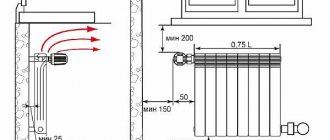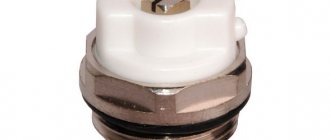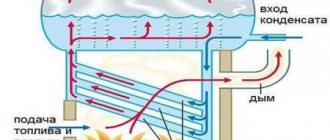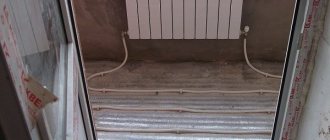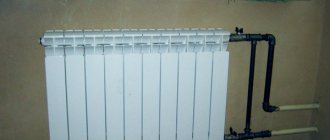Replacing heating batteries in an apartment can entail a number of significant costs. Many homeowners in apartment buildings (hereinafter referred to as MKD) know this. If we talk about the fact that even heating radiators located inside apartments can belong to common property, then not every person knows about this.
In certain situations, the apartment owner does not have to change batteries at his own expense. Their timely replacement and maintenance in proper condition, elimination of leaks and other problems may be the responsibility of the management company (hereinafter referred to as the management company). Moreover, unauthorized replacement of batteries can be considered by law a violation of the rules for using residential premises in an apartment building, which entails a fine of up to 1.5 thousand rubles (according to Article 7.21 of the Code of Administrative Offenses of the Russian Federation).
We will talk about these and other features of replacing heating batteries in an apartment in this article.
Whose property are apartment radiators and pipes?
Heating radiators inside apartments in multi-unit apartment buildings may be classified as common property. This is regulated by the following legislative acts:
- Housing Code of the Russian Federation - see Article 36, Part 1.
- Civil Code of the Russian Federation - see Art. 290 part 1.
- RF PP No. 491 dated 08/13/2006 introduced into the rank of a legislative act the Rules for the maintenance of common property in MKD - see paragraphs 5 and 6 of these Rules (hereinafter referred to as the Rules for the operation of MKD).
In all of these acts of legislation, it is noted that radiators/heating radiators inside an apartment are classified as common property when they are part of a common system and serve more than one room.
If there is no shut-off valve on the riser in your apartment that allows you to disconnect the radiator from the general heating system, this is common property, and its maintenance in proper condition is the responsibility of the management company.
If there are shut-off valves on the pipes in front of the battery, repairing leaks in the central heating system radiators themselves or replacing them with more modern equipment is the responsibility of the homeowner. In this case, radiators will not be classified as common property - this is stipulated in paragraph 5 of the Rules for the Use of MKD. This section states that common property is everything that is located up to the shut-off valve (jumper) on the pipe outlet from the riser to the battery.
Paragraph 6 of the Rules states that the control and shut-off valves themselves are common property , which means that if there is a leak at the junction of the stop valve and the radiator, the management company must also fix the problem at its own expense.
If there is no shut-off valve from the heating riser towards the battery, replacing them yourself is prohibited (who should replace the heating risers in an apartment?). This can lead to an emergency, and will also entail a fine and, possibly, a requirement to dismantle illegally installed equipment.
Who should do maintenance and repairs and when?
According to the above standards, the repair and replacement of heating appliances related to common property is the responsibility of management companies , whose property is the entire heating system in the house, if this heating network does not have boundaries within the apartments (shut-off valves).
The article “Maintenance and repair of common property” can be found in the receipt for payment of services, according to which the owners of apartment buildings pay a monthly fee for the maintenance of this property (how is the heating fee determined?). The management company should seek funds for the repair and replacement of batteries and other communications included in the heating system from this fund.
We figured out who should do the repairs. Now let’s talk about when such equipment should be changed or repaired. In case of emergency - immediately.
The homeowner should not pay for these services to plumbers or other persons.
The issue of replacing radiators is more complicated. Here you should rely on GOSTs and other standards that determine the service life of batteries.
Who should change batteries and risers in apartments
when we started looking for what to do about it, lawyers and on jkhrus (a portal where questions in the housing and communal services sector are asked) answered us that “work on replacing heating devices must be agreed upon with the management organization. In turn, the management organization has the right to request a license from the organization carrying out work on replacing heating devices, since it is responsible for the technical condition of the common property to the owners of the premises of your apartment building.”
Our house is old. the batteries were leaking, but it was necessary to solve it urgently, my father decided to take everything into his own hands, calling men from work and a mechanic (he is not working now. His contacts are lost)... for which we are still paying for this.. some pipe burst, which was changed when replacing the battery - inspection companies came. they said - they did it themselves (since there are no official papers, they even called their master, but without official paperwork) - pay for the consequences of your flooded neighbors yourself.
We recommend reading: Resume of the Ministry of Emergency Situations for the position of junior nurse
How long is the service life according to GOST?
The scope of production and operation of batteries is regulated by GOST 31311-2005 and SP 60.13330.2012. They indicate the service life of heating devices, depending on the materials from which they are made:
- cast iron lasts 25-35 years;
- bimetallic – 25-30 years;
- aluminum – 20-25 years;
- steel - 15-20 years.
By finding out which radiators heat your apartment and when they were installed, you can understand whether it is time to replace them.
If the batteries cope with heating the room, maintaining the temperature in the apartment from +18 ° C, do not leak and do not have other defects, the management company may refuse to replace them even if their service life has expired.
Representatives of the management company can assess the condition of the heating batteries. As a result of the inspection, the commission will draw up an act in which the necessary recommendations will be given. If it is recommended to replace radiators that are common property, you can write an application for these manipulations to be carried out by the management company itself.
At whose expense is it possible to replace old radiators with new ones?
The management company must replace old batteries with new ones if they do not have shut-off valves and cannot be “cut off” from the general system with their help. The radiators themselves must also be paid for by the management company, since the new equipment will become their property.
In practice, management companies often refuse to buy, replace or repair heating devices at their own expense. This is the basis for going to court.
Throughout the country, there are known cases of such disputes being resolved in favor of homeowners.
If there are shut-off valves in the heating system, then you will have to replace the batteries at your own expense. But it still won’t be possible to do without the participation of the management company. The rules for operating MKD establish (see clause 5.2.5) that it is necessary to obtain permission to carry out these actions. In addition, you can only choose the right batteries by consulting with management specialists.
Before replacing batteries, you need to conduct an examination and calculate which radiators you need to buy (how many sections, etc.). The examination, if the heating devices are not common property, is also paid by the apartment owner. There is no need to make changes to the technical passport - replacing batteries is not a redevelopment or refurbishment if they are installed in the same places where the old ones were.
Who should change heating batteries in an apartment, including a privatized one?
If you nevertheless changed the battery in the apartment at your own expense, you have the right to demand compensation from the management company through the court. However, practice shows that such disputes are rarely resolved in favor of the owner. If you find yourself in this situation, it is advisable to contact a lawyer for professional help.
We recommend reading: How many square meters per child?
However, when the need arises to change the batteries in an apartment (especially in a privatized one), both the owner and the management company interpret the legislation in their own interests. Due to regular judicial appeals, the need arose to clarify the normative act.
How to change or repair a heating device for free through the management company / housing office?
So, you live in an apartment where the heating appliances that are the property of the management company are long overdue for replacement, or you purchased housing on the secondary market and are faced with such a need. Just one desire is not enough - the legality of the requirements for free replacement of batteries must be proven - the service life has expired, or the batteries cannot cope with heating the apartment, do not provide the required temperature, have defects, etc. (find out the temperature schedule of the central heating supply according to GOST and water heating standards in heating system radiators can be found here).
In order to officially repair or replace radiators through the Housing Office, there must be a reason. The algorithm of actions must be specific if you want to achieve your goal without damaging your own nerves and wasting extra time. All applications must be submitted in writing . Instructions on how to obtain free replacement or repair of heating devices in an apartment are given below.
Where to contact?
- First, contact your management company to conduct an examination and draw up a report on checking the temperature in the apartment or analyzing the condition of the heating radiators.
- Based on the recommendations given based on the results of the examination, submit a written application to the Criminal Code to replace the batteries (in two copies - on yours the employee receiving the application must put the entry number with the date of acceptance and a legible signature).
If the management company fulfills its obligations, the issue is resolved; all that remains is to wait for the batteries to be repaired/replaced.
If the management company evades its obligations, a complaint should be filed.
After making a claim, as in the case of an application, bring two copies. Yours should contain all the same data:
- incoming number;
- date of;
- signature of the employee who accepted the document.
You should go to court only after directly contacting your management company with an application for repair/replacement of batteries. Perhaps representatives of the Criminal Code will accommodate you and you won’t have to contact other authorities. Going to court is only after sending a written complaint to the Criminal Code. Failure to comply with the requirements set out in the complaint will be the basis for the claim.
Required documents
When submitting an application to the Criminal Code for a free replacement of heating devices in an apartment, you need to add to this document a report drawn up by specialists on measuring the temperature inside the apartment or examining the condition of the batteries - a document confirming the validity of your request. You can’t do without a certificate of ownership of the apartment. You can also attach receipts for no arrears on utility bills.
Drawing up an application
An application for free replacement or repair of heating batteries should be written to the head of the management company. The application must contain the following subparagraphs:
- the header indicates to whom the application is addressed, the full name and position of the person, as well as from whom it comes - your full name, address and telephone number for contact;
- write to ;
- provide complete information about the situation, describe the essence of your request, based on legislative acts.
In addition to the above standards regulating the legality of citizens' demands for free replacement of heating batteries, we can mention the Housing Code (for example, Article 161, which describes the responsibility of the management company to manage apartment buildings in such a way that it provides residents with comfortable and safe living conditions), Rules for the provision of utility services, approved RF PP No. 354 of May 6, 2011 (lack of maintenance of heating equipment violates the provisions of these Rules).
The statement must describe the problem in as much detail as possible, but without unnecessary words or emotional overtones.
Do not write threats or insults under any circumstances - this will not help matters. The essence of your requirements should be extremely clear, the style of presentation should be businesslike.
Be sure to indicate at the end of the application what actions you will take if the request is not granted. It is better to combine this information with the phrase: “If the requirements set out in this application are not met, I reserve the right to contact ....” At the end, you must indicate the date the application was drawn up, sign and your surname with initials.
If you find it difficult to write a statement on your own, or immediately want to present the information as convincingly as possible, then a lawyer with experience in handling cases in the public utility sector will help you draft it correctly.
We do not recommend completing the documents yourself. Save time - contact our lawyers by phone:
8 (800) 350-14-90
Duration of the procedure
The law does not establish deadlines for replacing heating appliances. In emergency situations, safety measures must be taken immediately. How long the resolution of the issue may take, if there is no urgent need, depends only on your management company.
To reduce the time required to resolve the issue, the application can indicate the time interval for performing the work; it is better to start from the beginning of the heating season (“... I ask you to replace the batteries with new ones / carry out repairs before the start of the heating season .. year”). During the heating season, without emergency reasons, it will be difficult to obtain free work.
If it comes to filing a claim, it is necessary to indicate the deadlines for fulfilling your requirements. If the issue is resolved by the court, the time frame will be set by this body.
What difficulties with the law may arise if you carry out the work yourself?
Replacing batteries in an apartment yourself is fraught with:
- disturbance of heat exchange in the house;
- emergency situations;
- fines.
If you replace the batteries without permission, then in case of any accidents, the owner of the apartment will pay for damage to property. Moreover, not only to neighbors, but also to the management company.
Batteries that do not belong to the property of the management company can be replaced only after receiving written permission.
It is better to entrust the work to the employees of your management company, since in further emergency situations they will be responsible for violations in the operation of the heating system of the house. Third-party organizations will not be able to provide the homeowner with legal protection in the event of accidents, including those that arose through no fault of the homeowner.
You may be interested in looking at other articles about heat supply rules, commercial heat energy metering, types and costs of major and other types of repairs of heating systems in an apartment building, heat metering devices, heating season schedule in 2021, reasons for turning off heat supply in an apartment and noise in batteries, temperature charts and water heating standards in heating system radiators, as well as what to do if the battery leaks.
Responsibility for flooding neighbors when a new battery breaks
Of course, this is the most pressing question that needs to be answered. There are many examples in life when the breakdown of one battery led to the flooding of several floors. In such a situation, the potential defendant is the property owner or management company.
If the management company can prove that it is not responsible for this particular battery, then the owner will have to bear the costs. And this is only possible in two cases. We will consider them.
When the battery, which is a common property, was replaced by the apartment owner himself
Most batteries in apartment buildings are common property. And if there is a breakthrough, then the responsibility falls on the management company. But the management company can avoid punishment if it provides strong evidence that the owner unauthorizedly replaced the battery, that is, did not agree on the replacement.
For whose money should the batteries in the apartment be changed - the owner or the management company?
The fact of illegal interference in the operation of engineering systems is the basis for the court to blame the owner for flooding the neighbors.
To prevent such a situation and avoid negative consequences, before replacing radiators you need to send a (written) notification to the management company about your intentions. It should also indicate the radiator model and the date of intended installation. Be sure to keep proof of delivery of the notice.
The responsibilities of the management company include timely draining of water from the heating system. She must send an employee to supervise the installation of the battery (if the installation will be carried out by outside specialists).
Thus, the apartment owner will be able to prove that the installation of the battery was agreed upon with the management company, which means that he is not responsible for the flooding of his neighbors.
When a battery is not common property
This is a fundamental point between the division of responsibility between the owner of the apartment and the management company. The fact is that the management company is responsible only for common property, so damage can only be charged to it for failure to comply with immediate responsibilities.
Judicial practice is such that a battery is recognized as common property if there are the following signs:
Repair, reupholstery and replacement of a sagging stretch ceiling in an apartment
- It heats more than one apartment (for example, the heating radiator is located on the landing).
- The battery is not equipped with an individual shutdown device, as a result of which dismantling is possible only when the entire heating system of the apartment building is turned off.
If there are such signs, then the management company is responsible for the proper condition of the radiator. Therefore, in a situation with a battery breakdown, the management company compensates for the damage.
The owner will have to pay for losses if it is technically possible to replace the heating radiator without shutting down the entire heating system of the house.
